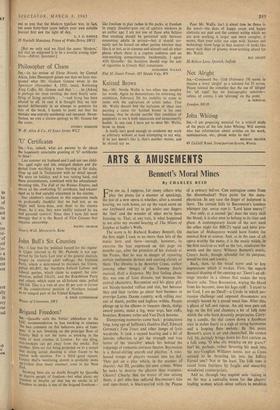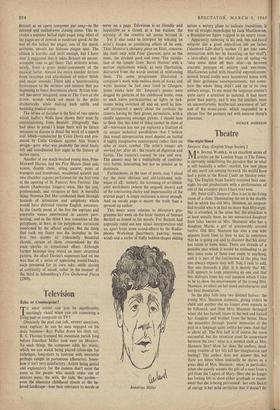ARTS & AMUSEMENTS
Bennett's Moral Mines
By CHARLES REID
FGH me as, I suppose, for many others who play the piano (in a manner of speaking), the test of a new opera is whether, after a second hearing, we rush home, set up the vocal score on our keyboard and try to get under our fingers the 'feel' and the wonder of what we've been listening to. That, at any rate, is what happened to me after my second hearing of The Mines of Sulphur at Sadler's Wells.
The score is by Richard Rodney Bennett. On the first night I took in no more than bits of the music here and there—enough, however,, to exorcise the fear expressed on this page six months ago, after the premiere of his A ubade at the Proms, that he was in danger of repeating certain melismatic devices and making cliches of them. The libretto is by Beverley Cross, author (among other things) of the Tommy Steele musical, Half a Sixpence. My first feeling about this was one of faint distaste, not because the central characters, Boconnion and his gipsy girl, are bloody-handed ruffian and slut, but because they and their victims go about their business in overripe Lorna Doone country, with rolling mist out of doors, potties and logfires within. People plunge up to the elbows in treasure chests, dodge sword points, make a leg, wear wigs, lace cuffs, breeches, Romney satins and Van Dyck bosoms.
Dampening memories came back : productions long, long ago of Sullivan's Haddon Hall, Edward German's Tom Jones and other lumps of lyric wardrobe. It took a second hearing and a bit of interim reflection to get the strength and true terror of the 'morality' which lies behind the trappings of romantic costume theatre. Boconnion is a throat-slitting anarch and playboy.' A mist- bound troupe of players wander into his fief. They put on a play which, in the manner of Hamlet, Act III, parables his own crimes. When he seeks to destroy the players they evanesce. Ghosts? Clearly. But the breast of one among them, a girl who has suffered Boconnion's kiss and rape-threat, is blackspotted with the Plague of a century before. Can contagion come from the disembodied? Nice point for the meta- physician. In any case the finger of judgment is there. The curtain falls to Boconnion's toneless whimper (pp, senza espr.): 'Lord have mercy!'
Not only, at a second `go,' does the story chill the blood; it is also seen to belong to its time and place. A contemporary locale of the sort used the other night for BBC2's tepid and bitty pro- duction of Mahagotzny would have frozen the musical flow at source. And, as in the case of all opera worthy the name, it is the music which, in the first analysis as well as the last, vindicates the words and the story. Without Bennett's music, Cross's book, though splendid for its purpose, would be thin and tawdry.
Back, then, to the vocal score and to key impressions which it evokes. First, the superb musical shaping of the opening act. There's an off- stage murder in a silence that makes the very theatre ache. Then Boconnion, wiping the blood from his bayonet, does his Iago stuff : 'I crawl to no God, I see no Devil'—a Credo in which per- cussive challenge and opposed dissonances are strongly bound by a proud vocal line. After this, a phase of lull and repose. An old man puts ash logs on the fire and chunters a bit of folk tune which the solo horn dreamily perpetuates. Carry- ing a candle, the slut comes down a Jacobean stair in stolen finery to a sigh of string harmonies and a looping flute melody. By this point Bennett's score is set and channelled. He cannot fail. He daringly brings down his first curtain on a folk song, '0 who sits weeping on my grave?' Isn't he, perhaps, rather thrusting his neck into the neo-Vaughan Williams noose, just as Cross seemed to be thrusting his into the Jeffrey Farnol one? Not in the least. The folk tune is saved from fustiness by fragile and unearthly woodwind counterpoints.
And so, through two sequent acts —taking in on the way a contralto scena for the players' leading woman which alone suffices to establish Bennett as an opera composer pur sang—to the debated and mulled-over closing scene. This in- cludes a soprano ballad eight pages long. Most of the pages are of slowish or moderate speed. At the end of the ballad the singer, one of the spook actresses, unveils her hideous plague spot. The climax is horrific and swift enough, but I have seen it suggested that it takes Bennett an uncon- scionable time to get there. This stricture arises, surely, from a gross under-assessment of the musical factor. Almost the entire number derives from swayings and alternations of minor thirds and major seconds. These add a heartbreaking forlornness to the eeriness and menace that are beginning to fence Boconnion about. Britten him- self has never imagined, even in The Turn of the Screw, sounds which are more to the point dramatically while making such subtle and haunting musical sense.
The Mines of Sulphur is the first of two operas which Sadler's Wells have shown their nous by .commissioning from Bennett. (Originally they had three in mind.) I hope there will be future occasion to discuss in detail the work of a superb cast which—conducted by Colin Davis and pro- duced by Cohn Graham against Alix Stone's design—gave what was probably the most finely felt and coordinated first night in the history of native opera.
Another of our much-bruited young men, Peter Maxwell Davies, had his Five Motets (four solo voices, double choir, string quintet, pairs of trumpets and trombones, woodwind quintet and two chamber organs) performed for the first time at the opening of St. Pancras Arts Festival. The choirs (Ambrosian Singers) were, like the rest, professionals, and virtuosos at that. A merciful thing. Norman Del Mar conducted them through hazards of intonation and antiphony which would have defeated routine English amateurs. In the fourth motet of the five the soprano and contralto voices intertwined in austere part- writing; and in the third I was conscious of the polyphony, at least, in the polyphonic variations mentioned by the official analyst. But the thing that took my fancy was the interplay in the first two motets of iridescently beautiful chords, certain of them crescendoed by the male chaus to sensational effect. Although further hearings may reveal an inner structural pattern, the effect Davies's sequences had on me was that of a series of appetising sound-blocks, each presented for its own sake, while aiming at continuity of mood, rather in the manner of the third in Schoenberg's Five Orchestral Pieces (1909).



































 Previous page
Previous page